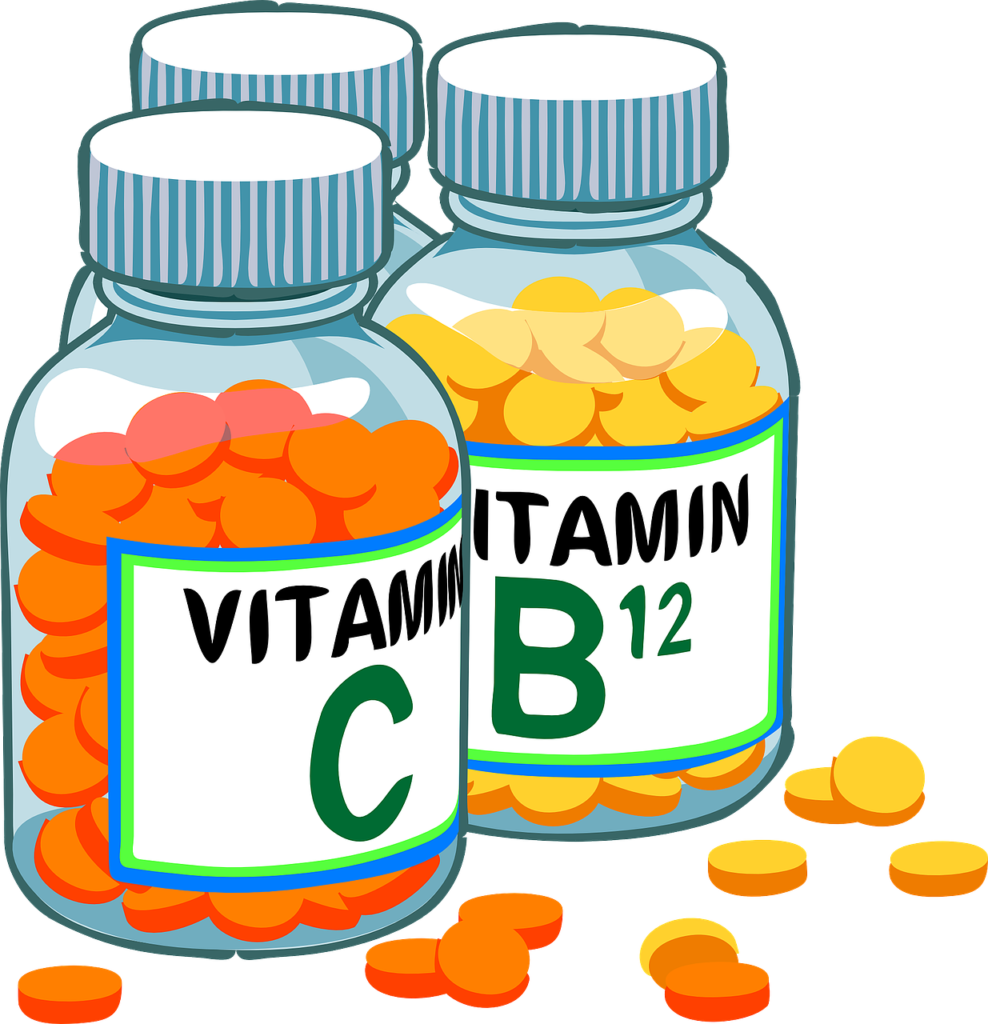Are you curious about which vitamin is the absolute key to maintaining a healthy body? Well, wonder no more, because we have the answer! In this article, we will reveal the most crucial vitamin that your body needs to function at its best. Whether you’re an avid health enthusiast or just someone looking to improve their well-being, understanding the importance of this particular vitamin is essential. So sit back and get ready to discover the vital role it plays in keeping you in top shape!

Vitamin A
Functions in the body
Vitamin A is a crucial nutrient that plays various vital roles in the human body. One of its primary functions is promoting good vision. It maintains the health of the eye’s retina and cornea, supporting optimal eyesight. Additionally, Vitamin A is essential for the growth and development of healthy skin and mucous membranes, acting as a protective barrier against harmful pathogens. It also plays a crucial role in the immune system’s function, helping to fight off infections and diseases.
Sources of vitamin A
To ensure an adequate intake of Vitamin A, it is important to consume foods rich in this nutrient. Some excellent dietary sources of Vitamin A include liver, fish oil, dairy products, eggs, and fortified cereals. Additionally, fruits and vegetables such as carrots, sweet potatoes, apricots, spinach, and kale are also great sources of provitamin A carotenoids which can be converted into Vitamin A in the body.
Symptoms of deficiency
A deficiency in Vitamin A can lead to several health issues. One of the earliest signs of deficiency is night blindness, where individuals struggle to see in low-light conditions. This can progress to a more severe condition called xerophthalmia, which causes dryness and damage to the cornea, leading to blindness if left untreated. Other symptoms may include dry skin, increased susceptibility to infections, and impaired immune function.
Recommended daily intake
The recommended daily intake of Vitamin A varies depending on age, gender, and life stage. For adult men, it is generally advised to consume about 900 micrograms of Vitamin A per day, while adult women should aim for around 700 micrograms. Pregnant and lactating women may require higher amounts, as recommended by healthcare professionals. It is important to note that excessive intake of Vitamin A through supplements can be harmful, so it is always recommended to consult with a healthcare provider before starting any supplementation.
Vitamin B1 (Thiamine)
Functions in the body
Vitamin B1, also known as thiamine, is crucial for the proper functioning of the nervous system. It helps convert carbohydrates into energy, allowing the body’s cells to function optimally. Thiamine is also involved in the synthesis of neurotransmitters, which play a vital role in transmitting signals between nerve cells. Furthermore, it is essential for maintaining a healthy cardiovascular system and promoting proper muscle function.
Sources of vitamin B1
To ensure an adequate intake of Vitamin B1, it is important to include foods that are rich in this nutrient in your diet. Good dietary sources of thiamine include whole grains, fortified cereals, legumes, nuts, meat (especially pork), and fish. Adding these foods to your meals can help meet your daily thiamine requirements and maintain overall health.
Symptoms of deficiency
A deficiency in Vitamin B1 can manifest in various ways. The most common symptom is beriberi, a condition that affects the nervous and cardiovascular systems. Symptoms of beriberi may include fatigue, muscle weakness, difficulty walking, and even heart problems. Additionally, thiamine deficiency can lead to Wernicke-Korsakoff syndrome, a severe neurological disorder that affects memory and coordination.
Recommended daily intake
To meet the daily requirements of thiamine, it is generally recommended that adult men consume around 1.2 milligrams per day, while adult women should aim for approximately 1.1 milligrams. Pregnant and lactating women may require slightly higher amounts. It is worth noting that cooking methods like boiling can cause thiamine loss in food, so it’s advisable to use cooking techniques that minimize nutrient degradation.

Vitamin B2 (Riboflavin)
Functions in the body
Vitamin B2, also known as riboflavin, plays a vital role in energy production. It is involved in various metabolic processes, particularly in the breakdown of carbohydrates, proteins, and fats. Additionally, riboflavin acts as an antioxidant, protecting cells from damage caused by harmful free radicals. It also supports the growth and development of tissues, such as skin, eyes, and the nervous system.
Sources of vitamin B2
Including foods rich in Vitamin B2 is essential to maintain adequate levels of this nutrient. Some excellent dietary sources of riboflavin include milk, yogurt, cheese, eggs, lean meats, fish, and poultry. Green leafy vegetables, whole grains, and fortified cereals also provide riboflavin. Incorporating these foods into your diet can help ensure a sufficient intake of Vitamin B2.
Symptoms of deficiency
A deficiency in Vitamin B2 can lead to several health issues. Common symptoms include skin problems like dryness, cracks, and inflammation around the mouth and nose. Individuals may also experience a swollen tongue, throat, and mouth. Additionally, deficiency can cause eye-related problems such as inflamed, bloodshot eyes, and increased sensitivity to light.
Recommended daily intake
The recommended daily intake of riboflavin varies depending on age, gender, and life stage. For adult men, it is generally advised to consume about 1.3 milligrams of riboflavin per day, while adult women should aim for around 1.1 milligrams. Pregnant and lactating women may require slightly higher amounts. Consuming a well-balanced diet that includes foods rich in Vitamin B2 is typically sufficient to meet the daily requirements.
Vitamin B3 (Niacin)
Functions in the body
Vitamin B3, also known as niacin, plays a critical role in cellular energy production. It is involved in the metabolism of carbohydrates, fats, and proteins, ensuring they are properly utilized by the body for energy. Niacin also supports the function of the nervous system and aids in the production of various hormones and DNA. It is essential for maintaining healthy skin, digestive system, and cardiovascular health.
Sources of vitamin B3
Including foods rich in Vitamin B3 in your diet is crucial to maintain adequate levels. Niacin can be found in a variety of foods, including meat (especially poultry and fish), legumes, nuts, seeds, whole grains, and fortified cereals. Additionally, milk and dairy products, as well as certain vegetables like mushrooms and leafy greens, also provide niacin.
Symptoms of deficiency
A deficiency in Vitamin B3 can lead to a condition known as pellagra. Common symptoms of pellagra include dermatitis, characterized by rough, scaly skin, diarrhea, and dementia. If left untreated, pellagra can progress to more severe health complications, including neurological issues and even death.
Recommended daily intake
The recommended daily intake of niacin varies depending on age, gender, and life stage. For adult men, it is generally advised to consume about 16 milligrams of niacin per day, while adult women should aim for around 14 milligrams. Pregnant and lactating women may require slightly higher amounts. It is important to note that excessive intake of niacin through supplements can cause harmful side effects and should be done under the guidance of healthcare professionals.

Vitamin B6
Functions in the body
Vitamin B6, also known as pyridoxine, is involved in numerous essential functions within the body. It acts as a coenzyme, supporting the metabolism of carbohydrates, proteins, and fats. This vitamin is crucial for brain development and function, as it helps produce neurotransmitters such as serotonin, dopamine, and gamma-aminobutyric acid (GABA). Vitamin B6 also plays a role in supporting the immune system and maintaining proper hormone balance.
Sources of vitamin B6
Consuming foods rich in Vitamin B6 is essential to meet the body’s requirements for this nutrient. Good dietary sources of pyridoxine include poultry, fish, lean meats, eggs, legumes, whole grains, nuts, seeds, and bananas. Incorporating these foods into your daily meals and snacks can help ensure an adequate intake of Vitamin B6.
Symptoms of deficiency
A deficiency in Vitamin B6 can lead to various health issues. Common symptoms include fatigue, confusion, irritability, depression, and a weakened immune system. Skin problems like rashes and dryness may also occur. Additionally, individuals with low levels of Vitamin B6 may experience neurological symptoms such as numbness and tingling in the hands and feet.
Recommended daily intake
The recommended daily intake of Vitamin B6 varies depending on age, gender, and life stage. For adult men, it is generally advised to consume about 1.3-1.7 milligrams of pyridoxine per day, while adult women should aim for around 1.3-1.5 milligrams. Pregnant and lactating women may require slightly higher amounts. Ensuring a balanced diet with a variety of foods can typically provide an adequate intake of Vitamin B6.
Vitamin B12
Functions in the body
Vitamin B12, also known as cobalamin, is essential for various bodily functions. It plays a crucial role in the production of red blood cells, ensuring optimal oxygen transport throughout the body. Vitamin B12 is also involved in DNA synthesis and the maintenance of a healthy nervous system. Additionally, it supports cognitive function, energy production, and the metabolism of amino acids and fatty acids.
Sources of vitamin B12
To meet the body’s Vitamin B12 requirements, it is important to consume foods rich in this nutrient. The primary dietary sources of cobalamin are animal-derived products such as meat, fish, poultry, eggs, and dairy products. It may be more challenging for individuals following a strict vegetarian or vegan diet to obtain sufficient amounts of Vitamin B12, so supplementation or fortified plant-based products should be considered.
Symptoms of deficiency
A deficiency in Vitamin B12 can lead to various health problems, particularly related to blood and nerve function. Common symptoms include fatigue, weakness, shortness of breath, and pale skin. Neurological symptoms may include tingling and numbness in the hands and feet, difficulty with balance, and even memory loss or confusion. If left untreated, Vitamin B12 deficiency can cause irreversible nerve damage.
Recommended daily intake
The recommended daily intake of Vitamin B12 varies depending on age, gender, and life stage. For adults, it is generally advised to consume about 2.4 micrograms of cobalamin per day. Pregnant and lactating women may require slightly higher amounts. It is important for individuals following plant-based diets to ensure they meet their Vitamin B12 needs through fortified foods or supplementation.

Vitamin C
Functions in the body
Vitamin C, also known as ascorbic acid, is a powerful antioxidant that plays numerous essential roles in the body. It is involved in collagen synthesis, promoting the growth and repair of tissues, such as skin, bones, and blood vessels. Vitamin C also supports the immune system, helping fight off infections and enhancing the absorption of iron. Additionally, it acts as an antioxidant, neutralizing harmful free radicals and protecting cells from damage.
Sources of vitamin C
Including foods rich in Vitamin C in your diet is crucial to maintain adequate levels of this nutrient. Citrus fruits such as oranges, lemons, and grapefruits are well-known sources of ascorbic acid. Other fruits like strawberries, kiwi, and papaya are also excellent sources. Vegetables such as bell peppers, broccoli, tomatoes, and leafy greens, including spinach and kale, provide Vitamin C as well.
Symptoms of deficiency
A deficiency in Vitamin C can lead to a condition called scurvy. Common symptoms include fatigue, weakness, joint and muscle pain, and bleeding gums. Individuals with low levels of Vitamin C may also experience slow wound healing, dry and rough skin, and frequent infections.
Recommended daily intake
The recommended daily intake of Vitamin C varies depending on age, gender, and life stage. For adults, it is generally advised to consume about 75-90 milligrams of ascorbic acid per day. Pregnant and lactating women may require slightly higher amounts. It is worth noting that excessive intake of Vitamin C through supplementation may cause digestive issues for some individuals, so it is always beneficial to obtain nutrients from whole food sources whenever possible.
Vitamin D
Functions in the body
Vitamin D is a unique nutrient that acts as both a vitamin and a hormone in the body. It plays a crucial role in regulating calcium and phosphate levels, ensuring optimal bone health and development. Vitamin D also supports the immune system, helps reduce inflammation, and contributes to proper muscle function. Additionally, it is involved in cell growth and modulation and may have a role in cardiovascular health.
Sources of vitamin D
To meet the body’s Vitamin D requirements, it is essential to obtain this nutrient from various sources. The primary source of Vitamin D is sunlight exposure. When UVB rays from the sun interact with the skin, Vitamin D synthesis occurs. However, it can also be obtained from dietary sources such as fatty fish (salmon, mackerel), eggs, fortified dairy products, and certain mushrooms.
Symptoms of deficiency
A deficiency in Vitamin D can lead to several health problems, particularly related to bone health. Common symptoms include decreased bone density, which can increase the risk of fractures and osteoporosis. Individuals with low levels of Vitamin D may also experience muscle weakness, fatigue, and an increased susceptibility to infections.
Recommended daily intake
The recommended daily intake of Vitamin D varies depending on age, gender, and geographical location. As sunlight exposure can be affected by factors such as latitude, season, and skin pigmentation, it is recommended to obtain Vitamin D levels through a combination of sunlight and dietary sources. For adults, a general guideline is to aim for 600-800 international units (IU) of Vitamin D per day. However, individual requirements may vary, and consulting with a healthcare provider is advisable.

Vitamin E
Functions in the body
Vitamin E is a powerful antioxidant that helps protect cells from damage caused by harmful free radicals. It plays a vital role in maintaining healthy skin and supporting proper immune function. Vitamin E also aids in the formation of red blood cells and enhances the body’s ability to utilize Vitamin K. Additionally, it may have anti-inflammatory properties and contribute to cardiovascular health.
Sources of vitamin E
Including foods rich in Vitamin E in your diet is crucial to maintain sufficient levels of this nutrient. Good dietary sources of tocopherols and tocotrienols (forms of Vitamin E) include vegetable oils, nuts and seeds (such as almonds, sunflower seeds, and peanuts), and green leafy vegetables (like spinach and kale). Incorporating these foods into your meals and snacks can help ensure an adequate intake of Vitamin E.
Symptoms of deficiency
A deficiency in Vitamin E is relatively rare, but it can still occur in certain individuals. Common symptoms may include muscle weakness, vision problems, and impaired immune function. Deficiency can also lead to nerve damage, causing difficulties with coordination and balance.
Recommended daily intake
The recommended daily intake of Vitamin E varies depending on age and gender. For adults, it is generally advised to consume about 15 milligrams of tocopherols and tocotrienols per day. Pregnant and lactating women may require slightly higher amounts. It is important to note that excessive intake of Vitamin E through supplements may have adverse effects, so it is advisable to obtain this nutrient primarily from natural food sources.
Vitamin K
Functions in the body
Vitamin K is essential for proper blood clotting, helping prevent excessive bleeding. It also plays a crucial role in bone health, contributing to the synthesis of certain proteins necessary for bone formation. Vitamin K may have anti-inflammatory properties, supporting overall immune function. Additionally, it is involved in regulating calcium metabolism and may have a role in protecting against arterial calcification.
Sources of vitamin K
Including foods rich in Vitamin K in your diet is vital to meet the body’s requirements for this nutrient. Green leafy vegetables such as spinach, kale, and collard greens are excellent sources of Vitamin K. Other sources include broccoli, Brussels sprouts, cabbage, and fermented foods like sauerkraut and natto. Additionally, certain vegetable oils, such as soybean oil, contain Vitamin K.
Symptoms of deficiency
A deficiency in Vitamin K can lead to blood clotting issues and increased bleeding tendency. Common symptoms may include easy bruising, prolonged bleeding from wounds or gums, and excessive bleeding during menstruation. Individuals taking certain medications that interfere with Vitamin K absorption may also be at an increased risk of deficiency.
Recommended daily intake
The recommended daily intake of Vitamin K varies depending on age, gender, and life stage. For adults, it is generally advised to consume about 90-120 micrograms of Vitamin K per day. Pregnant and lactating women may require slightly higher amounts. It is important to note that individuals taking blood-thinning medications should discuss their Vitamin K intake with a healthcare provider, as Vitamin K can interfere with the medication’s effectiveness.
Understanding the importance of vitamins and ensuring an adequate intake of these essential nutrients is crucial for maintaining optimal health. Incorporating a variety of nutrient-rich foods into your diet, including the sources mentioned for each vitamin, can help meet your daily requirements. If you have specific concerns about your vitamin intake or suspect a deficiency, consulting with a healthcare professional is always recommended. Remember, a balanced and diverse diet, combined with a healthy lifestyle, is key to supporting your body’s overall well-being.

